COVID19 news
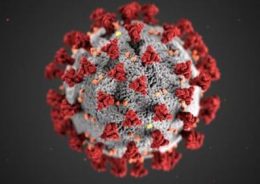
Omicron may be significantly better at evading vaccine-induced immunity, but less likely to cause severe disease
The Omicron variant of SARS-CoV-2 may be significantly better than previous variants at evading vaccine-induced antibodies, according to new researchRead more

Com-COV 3 COVID-19 vaccine study calls on teenager volunteers in Cambridgeshire
12 to 16 years old to receive a second dose of a COVID-19 vaccine, including Cambridgeshire.Read more
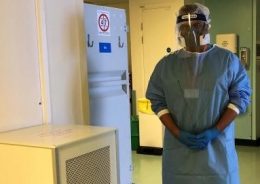
Using air filters on hospital wards remove almost all airborne Covid virus
A new study has found placing air filtration machines in COVID-19 wards at Addenbrooke’s Hospital, removed almost all traces of airborne SARS-CoV-2 virus.Read more
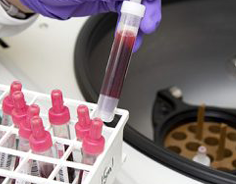
‘Biological fingerprint’ in blood could help identify COVID patients with no symptoms
Cambridge researchers are able to identify people who have had COVID-19 even if they displayed no symptoms. Read more

Key mutations in Alpha variant enable SARS-CoV-2 to overcome evolutionary weak points
One of the key mutations seen in the ‘Alpha variant’ of SARS-CoV-2 – the deletion of two amino acids, H69/V70 – enables the virus to overcome chinks in its armour as it evolves, Read more
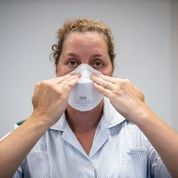
Upgrading PPE for staff working on COVID-19 wards cut hospital-acquired infections dramatically
When Addenbrooke’s Hospital in Cambridge upgraded its face masks for staff working on COVID-19 wards to filtering face piece 3 (FFP3) respirators, it saw a dramatic fall – up to 100% – in Read more
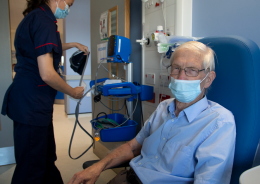
Cambridge begins world-first COVID-19 vaccine booster study
Researchers in Cambridge have welcomed their first participants in a new UK study to understand the effects of a ‘booster’ dose of a COVID-19 vaccine.Read more

Differing immune responses discovered in asymptomatic cases and those with severe COVID-19
A UK-wide study part-funded by the NIHR has identified differences in people’s immune responses to COVID-19, depending on whether they have no symptoms or more serious reactions to the virus.Read more
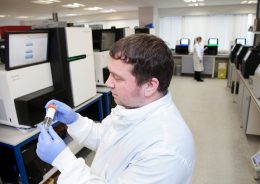
Genomics study identifies routes of transmission of coronavirus in care homes
Genomic surveillance – using information about genetic differences between virus samples – can help identify how SARS-CoV-2 spreads in care home settings.Read more

Single dose of Pfizer BioNTech vaccine reduces asymptomatic infections and potential for SARS-CoV-2 transmission
New data suggests that a single dose of the Pfizer BioNTech vaccine can reduce by 75% the number of asymptomatic SARS-CoV-2 infections.Read more

Can a tapeworm drug boost protection from Covid-19 for high-risk kidney patients?
A new trial led by Cambridge launches to see if the drug niclosamide, usually used to treat tapeworms, can prevent Covid-19 infection in vulnerable, high-risk kidney patients.Read more

Pfizer BioNTech vaccine likely to be effective against B1.1.7 strain of SARS-CoV-2
The Pfizer BioNTech vaccine BNT162b2 is likely to be effective against the B1.1.7 variant of SARS-CoV-2, even though its efficacy is modestly affected. However, when the E484K mutation – first seen in the South African variant – is added, it substantially increases the amount of antibody required to prevent infection.Read more

New research suggests COVID-19 severity can be predicted in hospitalised patients
Research conducted at Addenbrooke’s hospital and supported by the NIHR Cambridge Biomedical Research Centre has found it may be possible to predict which patients will go on to develop severe or long-term COVID Read more

DNA test can quickly identify pneumonia in patients with severe COVID-19, aiding faster treatment
Researchers have developed a DNA test to quickly identify secondary infections in COVID-19 patients, who have double the risk of developing pneumonia while on ventilation than non-COVID-19 patients.Read more

Software tool will help doctors identify and prevent hospital transmission of SARS-CoV-2
A new software tool developed in Cambridge will help doctors identify where cases of COVID-19 were caused by transmission within a hospital, helping them to prevent further spread of the disease.Read more
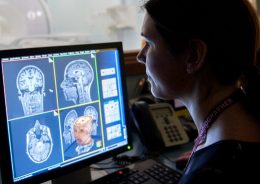
Age and pre-existing conditions increase risk of stroke among COVID-19 patients
Fourteen out of every 1,000 COVID-19 patients admitted to hospital experience a stroke, a rate that is even higher in older patients and those with severe infection and pre-existing vascular conditions, according to a report.Read more
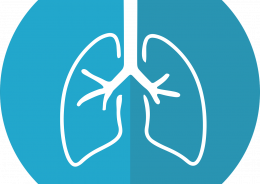
‘Mini-lungs’ reveal early stages of SARS-CoV-2 infection
To better understand how SARS-CoV-2 infects the lungs and causes disease, a team of scientists from the UK and South Korea turned to organoids – ‘mini-organs’ grown in three dimensions to mimic the behaviour of tissue and organs.Read more
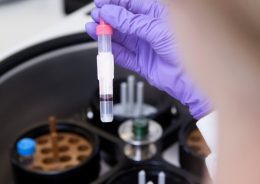
Supporting research at Cambridge University Hospitals
As the COVID-19 situation develops, research staff at CUH continue our support of COVID-19 research studies, including Urgent Public Health Studies (UPH), while maintaining safe recruitment to existing open studies. Read more

Punctured lung affects almost one in a hundred hospitalised COVID-19 patients
As many as one in 100 patients admitted to hospital with COVID-19 develop a pneumothorax – a ‘punctured lung’ according to a study supported by the NIHR Cambridge BRC. Read more

New research shows steroid improves survival of critically ill Covid-19 patients
New research published has been able to show that using the steroid hydrocortisone on patients with severe COVID-19 symptoms improves their recovery.Read more


